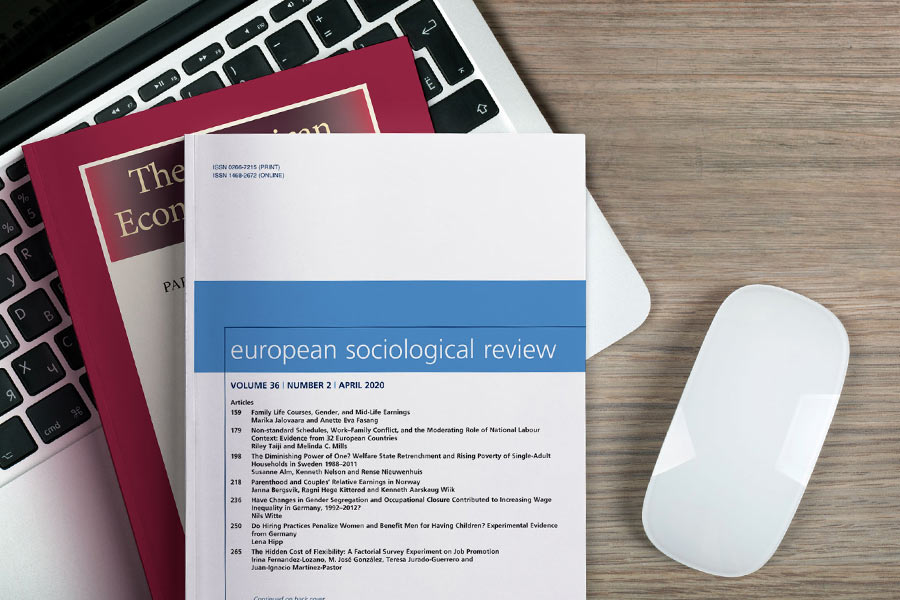Total hits 17.197
-
Book review: International financial issues in the Pacific rim: Global imbalances, financial liberalization, and exchange rate policy. Edited by Takatoshi Ito and Andrew K. Rose
Weber, E. (2010): Book review: International financial issues in the Pacific rim: Global imbalances, financial liberalization, and exchange rate policy. Edited by Takatoshi Ito and Andrew K. Rose. In: Pacific Affairs, Vol. 83, No. 2, p. 438-439.
-
Germany's job miracle in the world recession
Möller, J. (2010): Germany's job miracle in the world recession. Shock-absorbing institutions in the manufacturing sector. In: K. F. Zimmermann & C. Wey (Hrsg.) (2010): The economy, crises, and the labor market : can institutions serve as a protective shield for employment? (Applied Economics Quarterly Supplement, 61), p. 9-27.
-
Locus of control and job search strategies
Caliendo, M., Cobb-Clark, D. & Uhlendorff, A. (2010): Locus of control and job search strategies. (DIW-Diskussionspapiere 979), Berlin, 36 p.
-
The long-term impact of job displacement in Germany during the 1982 recession on earnings, income, and employment
Schmieder, J., Wachter, T. & Bender, S. (2010): The long-term impact of job displacement in Germany during the 1982 recession on earnings, income, and employment. (IAB-Discussion Paper 01/2010), Nürnberg, 28 p.
-
Demografischer Wandel: Auswirkungen auf den Arbeitsmarkt in Mecklenburg-Vorpommern
Kotte, V., Meier, H. & Stöckmann, A. (2010): Demografischer Wandel: Auswirkungen auf den Arbeitsmarkt in Mecklenburg-Vorpommern. (IAB-Regional. Berichte und Analysen aus dem Regionalen Forschungsnetz. IAB Nord 03/2010), Nürnberg, 35 p.
-
Does downward nominal wage rigidity dampen wage increases?
Stüber, H. & Beissinger, T. (2010): Does downward nominal wage rigidity dampen wage increases? (IZA discussion paper 5126), Bonn, 32 p.
-
Determinants for the success of labour market programmes * a plea for multi-methodic strategies of data collection and analysis exemplified by means of a regional pilot project
Fuchs, P. & Bauer, F. (2010): Determinanten für den Erfolg arbeitsmarktpolitischer Maßnahmen. Ein Plädoyer für multi-methodische Erhebungs- und Auswertungsstrategien am Beispiel eines regionalen Modellprojekts. In: Zeitschrift für Evaluation, Vol. 9, No. 2, p. 277-296.
-
Direct job creation in Germany revisited: Is it effective for welfare recipients and does it matter whether participants receive a wage?
Hohmeyer, K. & Wolff, J. (2010): Direct job creation in Germany revisited: Is it effective for welfare recipients and does it matter whether participants receive a wage? (IAB-Discussion Paper 21/2010), Nürnberg, 63 p.
-
Mate selection as a mutual choice : how men and women reply to contact offers in online dating
Schulz, F., Skopek, J. & Blossfeld, H. (2010): Partnerwahl als konsensuelle Entscheidung. Das Antwortverhalten bei Erstkontakten im Online-Dating. In: Kölner Zeitschrift für Soziologie und Sozialpsychologie, Vol. 62, No. 3, p. 485-514. DOI:10.1007/s11577-010-0107-0
-
Buchbesprechung: David Neumark, William L. Wascher: Minimum Wages, (Cambridge 2008)
König, M. & Möller, J. (Rez.) (2010): Buchbesprechung: David Neumark, William L. Wascher: Minimum Wages, (Cambridge 2008). In: Jahrbücher für Nationalökonomie und Statistik, Vol. 230, No. 3, p. 364-366. DOI:10.1515/jbnst-2010-0306
-
Brother Sun, Sister Moon: The lunar cycle, sunspots and the frequency of births
Bauer, T., Bender, S., Heining, J. & Schmidt, C. (2010): Brother Sun, Sister Moon: The lunar cycle, sunspots and the frequency of births. (Ruhr economic papers 225), Essen, 14 p.
-
Only a few women reach top positions
Kohaut, S. & Möller, I. (2010): Führungspositionen in der Privatwirtschaft: Frauen kommen auf den Chefetagen nicht voran. (IAB-Kurzbericht 06/2010), Nürnberg, 6 p.
-
Safeguarding jobs through labor hoarding in Germany
Dietz, M., Stops, M. & Walwei, U. (2010): Safeguarding jobs through labor hoarding in Germany. In: K. F. Zimmermann & C. Wey (Hrsg.) (2010): The economy, crises, and the labor market : can institutions serve as a protective shield for employment? (Applied Economics Quarterly Supplement, 61), p. 125-149.
-
Sample of Integrated Labour Market Biographies (SIAB) 1975-2008
Dorner, M., Heining, J., Jacobebbinghaus, P. & Seth, S. (2010): Sample of Integrated Labour Market Biographies (SIAB) 1975-2008. (FDZ-Methodenreport 09/2010 (en)), Nürnberg, 14 p.
-
The support of the further vocational training of the unemployed by the European Social Fund: A positive balance sheet
Deeke, A. (2010): Förderung beruflicher Weiterbildung von Arbeitslosen aus dem Europäischen Sozialfonds: Eine positive Bilanz. In: IAB-Forum No. 1, p. 46-51. DOI:10.3278/IFO1001W046
-
Further in-house training and the employment stability of elder persons: Do people who receive further training stay longer?
Bellmann, L., Pahnke, A. & Stegmaier, J. (2010): Betriebliche Weiterbildung und Beschäftigungsstabilität Älterer: Bleiben Geförderte länger? In: IAB-Forum No. 1, p. 30-35. DOI:10.3278/IFO1001W030
-
Deutschland leidet unter einem Brain Drain
Brücker, H. (2010): Deutschland leidet unter einem Brain Drain. Leitartikel. In: Wirtschaftsdienst, Vol. 90, No. 3, p. 138-139.
-
Ausbildungsberechtigung, Ausbildungsaktivität und Übernahmeverhalten von Betrieben
Stegmaier, J. (2010): Ausbildungsberechtigung, Ausbildungsaktivität und Übernahmeverhalten von Betrieben. In: Bundesinstitut für Berufsbildung, Bonn (Hrsg.) (2010): Datenreport zum Berufsbildungsbericht 2010 : Informationen und Analysen zur Entwicklung der beruflichen Bildung, p. 200-204.
-
Ist die Demografie unser Schicksal? Expansive Arbeitszeitpolitik - eine übersehene Option
Spitznagel, E. (2010): Ist die Demografie unser Schicksal? Expansive Arbeitszeitpolitik - eine übersehene Option. In: U. Heilemann (Hrsg.) (2010): Demografischer Wandel in Deutschland : Befunde und Reaktionen (Volkswirtschaftliche Schriften, 559), p. 55-75.
-
Kosten und Nutzen der Ausbildung an Tertiärbildungsinstitutionen im Vergleich
Riphahn, R., Eschelbach, M., Heineck, G. & Müller, S. (2010): Kosten und Nutzen der Ausbildung an Tertiärbildungsinstitutionen im Vergleich. In: Perspektiven der Wirtschaftspolitik, Vol. 11, No. 2, p. 103-131.



